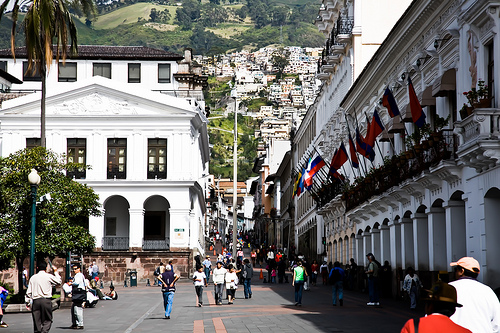This article comes to us courtesy of InternationalLiving.com, the world's leading authority on how to live, work, invest, travel, and retire better overseas.
Getting your residence in Ecuador has a number of benefits. Within 90 days of obtaining your visa, for instance, you can ship your household goods duty-free. And if you're 65 or older, you are entitled to all sorts of special treatment -- half-price bus transportation anywhere in the country, half-price tickets to movies, plus sporting and cultural events, discounted airfare, a free land-line telephone, and refund of your 12 percent IVA (value-added) tax.

Quito, Ecuador -- photo from InternationalLiving.com
You even get to cut to the front of the line at the bank! There are 19 different immigrant visa categories, but really only three ways you'll want to get residence (we recommend using a lawyer for each).
1. Pensioner's. For expats with retirement income, this is usually the preferred option, since it requires no major capital investment. It's the route I personally chose. You must show permanent income of at least $800 per month to qualify. An additional $100 per month income is needed for each dependent. Typically, this comes from the applicant's pension, Social Security, or fixed-income annuity (since funds cannot be withdrawn once the distribution phase begins). Unstable income from sources like rental properties or stocks is not acceptable. Your documentation must be notarized and apostilled, as well.
2. Investment in a Certificate of Deposit. You can obtain a CD from any financial institution recognized by the Central Bank of Ecuador. Recognized institutions include Banco de Pichincha, Produbanco, and Banco de Guayaquil. The minimum investment is $25,000, plus an additional $500 for each dependent. This money must stay in your account as long as you have this type of visa, although you can withdraw the accrued interest. If you successfully apply for citizenship after three years of residence, all money will be returned to you.
3. Investment in Real Estate. This can be a good choice if you're planning to own your home in Ecuador. Your property must be valued at a minimum of $25,000, plus $500 for each dependent. Note that this value is established by the tax office and may be wildly different from the purchase price. Often in the U.S. the "assessed value" of your home (especially in a robust real estate market) is much lower than its potential sales price. This is good news because your property tax is tied to the lower figure.
The same is true in Ecuador where the tax value of the home you wish to buy may not have been updated since it last changed hands years ago. So, for example, even though you pay $70,000 cash for your condo, if the current tax value is only $20,000, your investment does not satisfy the visa requirements (ouch!). Be sure to check on this before agreeing to purchase any property.
Also note that you must provide a deed for your property; the purchase process itself does not prove ownership. I have friends who bought a condo to get their visas, only to learn that the developer had violated the terms of his permit by adding two additional floors to the original plan after approval. To legally stay in the country, they had to fork over an additional $25,000 for a CD until the matter was resolved and they finally got their deed, over a year later.
How much will your visa cost?
Your visa application costs $30 and the visa itself only $320 for each family member. Assuming you provide correct documentation, your visa should be completed in only two months.
Until recently, the visa application process was often complicated and confusing. Long delays were the norm. Now major improvements have streamlined and simplified the requirements.
What is an 'Apostille?'
How do you prove to a foreign government that the documents you submit for your residence visa are authentic? In 104 countries, including the U.S., Canada, and Ecuador, you have them apostilled. This is a specific process for authenticating documents that these countries have agreed to. In the U.S., documents are apostilled by the Secretary of State in the state where the document is issued. All non-Ecuadorian documents you submit for your visa must be apostilled.
All required documents must be translated into Spanish. If this is done in your country of origin, the translations must also be apostilled. Avoid that hassle and expense and get this done in Ecuador. Any foreign-language school can do the translation for a nominal fee, and then only a quick trip to a notary is needed. All other forms like the application itself can be obtained in Ecuador or online.
Read More:
Cuenca, Ecuador: What Your Research Won't Tell You
Health Care in Ecuador: A Top Haven for Quality Care Overseas
The Happiest Expats I Know in Ecuador

